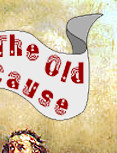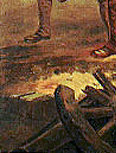The
reason why the New Millennium was welcomed in the
wrong year may be the same reason a lot of things
happen when they do. Sir Ernest Gellner, the sociologist,
once referred to the "postal error theory of
history," which may not have been original with
him. This theory held that, by some terrible mistake,
the liberating, revolutionary message meant for the
working classes had been handed over to sundry nationalist
movements, with deplorable results. Of course, where
the message did get in the "right" hands,
even more damage was done, but why quibble? Historians
still shed a conventional tear about what happened
to poor Rosa Luxemburg and Karl Liebknecht, but don't
these historians know what the comrades wanted
to do? Evidently, the "social changes"
envisioned by the comrades were just the thing, but
at the end of the 20th century we ought
to know better.
METAHISTORY,
QUIGLEY, AND 'CONSPIRACIES'
Metahistorians
like Oswald Spengler, Arnold Toynbee, Pitrim Sorokin,
and Carroll Quigley sought to find the processes by
which civilizations rise and decline. The first three
were rather gloomy – reacting in part to the civilizational
disaster known as World War I – although Spengler
did dare us to throw those historical dice. It's
just as well that he died before various historical
actors threw them in the disaster known as World War
II.
One
of the players in World War II, Uncle Joe Stalin,
had a metahistorical doctrine of his own, to which
he contributed a number of turgid essays even less
readable than those of Lenin and Trotsky. On Joe's
orders, as orchestrated by a Stalinist professor of
anthropology at Columbia University, Trotsky met with
assassination. No wonder no one trusts anthropologists
any more. Anyway, Stalin's historical doctrine held
that if everyone gave up control of everything to
his regime, in time everyone would have strawberries
and cream, after which this horrible regime would
"wither away." Even at 20 million plus
deaths this seemed a good deal to many people. Others
understandably resisted and under cover of helping
out, the other Uncle – Sam – made his bid for world
dominance.
Buoyed
up by their own sense of competence, Yankee ingenuity,
and American know-how, our northeastern elite built
a world empire on which the sun has not yet set.
They didn't notice, or didn't much care to notice,
that in the process they had deconstructed their own
country. Perhaps they just thought of it as a convenient
place to stand while carrying out their good work.
I only wish they had presented it clearly to the voters:
"Support the empire, destroy your way of life,
you'll feel better when it's all over." I'll
bet there wouldn't have been as big a consensus, had
they done so. So they said, instead: "Give us
total power to stop the commies and we'll give it
back later. Trust us." Many people did trust
them. H. L. Mencken long ago addressed why that might
be.
PHASES
OF CIVILIZATION
In
a roundabout way, this brings us back to Quigley.
The
Evolution of Civilizations (Indianapolis:
Liberty Press, 1979 [1961]) is probably his most important
book. In this work Quigley sought to find the developmental
pattern of civilizations. Very briefly, he spied
seven phases in the life of any civilization which
lasted long enough to go through the full set. These
are mixture, gestation, expansion, conflict, empire,
decay, and invasion. These phases are not "given"
to observation but are generalized from what we know
about past civilizations. There is no predictive
science here, nor does every civilization go through
all seven stages. Constituent states within a civilization
might so weaken the civilization through constant
warfare as to skip the empire phase, going straight
from conflict to decay and invasion. A civilization
in one of the first two phases might run up against
another in its expansion phase and simply succumb.
Quigley
believed that Western Civilization had, in effect,
recycled itself three times. Uniquely, it had gone
through three expansion phases based on feudalism,
merchant capitalism, and industrial capitalism, respectively.
Each expansion phase had kindled a conflict phase
without, however, leading to a universal empire incorporating
all or most of the civilization. When Quigley wrote,
it was not clear whether the United States could or
would bring the dubious blessings of universal empire
to Western Civilization.
AN
ANTI-WESTERN UNIVERSAL EMPIRE FOUNDED BY THE
WEST?
In
recent decades, the will to extend US imperialism
everywhere has certainly been in evidence. What is
interesting is that in recent years the US leadership's
will-to-power has gone hand in hand with an anti-Western
rhetoric about universal values, "diversity,"
and the like. The elite wields this rhetoric against
its own backward American people, who are expected
to pay for the elite's moral and political lost weekends,
whatever the damage to the original republican scheme
which the people were blind enough to let go.
Empires
tend to proclaim some universal mission as justification
for their existence. This may be the first time that
an empire has proclaimed the suicide of its civilization
as part of its mission. Even the Spanish empire's
trinity of God, gold, and glory seems more appealing
than amalgam of enforced diversity, the implementation
of UNESCO directives, and the realization of the UN
Declaration of Human Rights, here and now – if that
were the only other choice.
IS
ANYTHING TO BE DONE?
The
best choice of all would be to abandon the path of
empire, for empire destroys not just hapless foreigners
in its path but the core civilization from which it
arose. Of course ruling elites do not give up their
projects willingly. Some pressure from below will
be needed. Now there is a task worthy of a
new millennium. I suppose those who don't value Western
Civilization won't give a monkey's whether empire
destroys it or not. Anti-imperialists will just
have to learn how to talk past them to those who have
some lingering attachment to their own inheritance.
Historians
go astray quickly when predicting the future. I won't
make any predictions. Assessing "the present
situation" (as the Marxists like to say) is enough
for now. There is plenty of work to go around.
In
Quigleyan terms we see signs of the last three phases
of civilization – empire, decay, and invasion – all
around us, simultaneously. The strains on what the
New Left used to call "the system" are many.
Too bad so many of the New Left are now in
the system. The late shambles of an election may
be a good sign. It will be harder to inflict "fair
elections" on the foreign enemy state of the
week in the face of the inevitable ridicule. Next,
the Bushians – whatever their interest in rigging
the world oil market – seem to lack their late opponents'
ideological mania for doing right globally. Finally,
there are a few signs of cultural resistance. Home-schooling
is just one of them.
These
may be reasons for guarded optimism. Ludwig von Mises,
who wrote eloquently of the unique relationship of
Western Civilization to freedom, also had this to
say: "Bad policies can disintegrate our civilization
as they have destroyed many other civilizations.
But neither reason nor experience warrants the assumption
that we cannot avoid choosing bad policies and thereby
wrecking our civilization.1
Note









